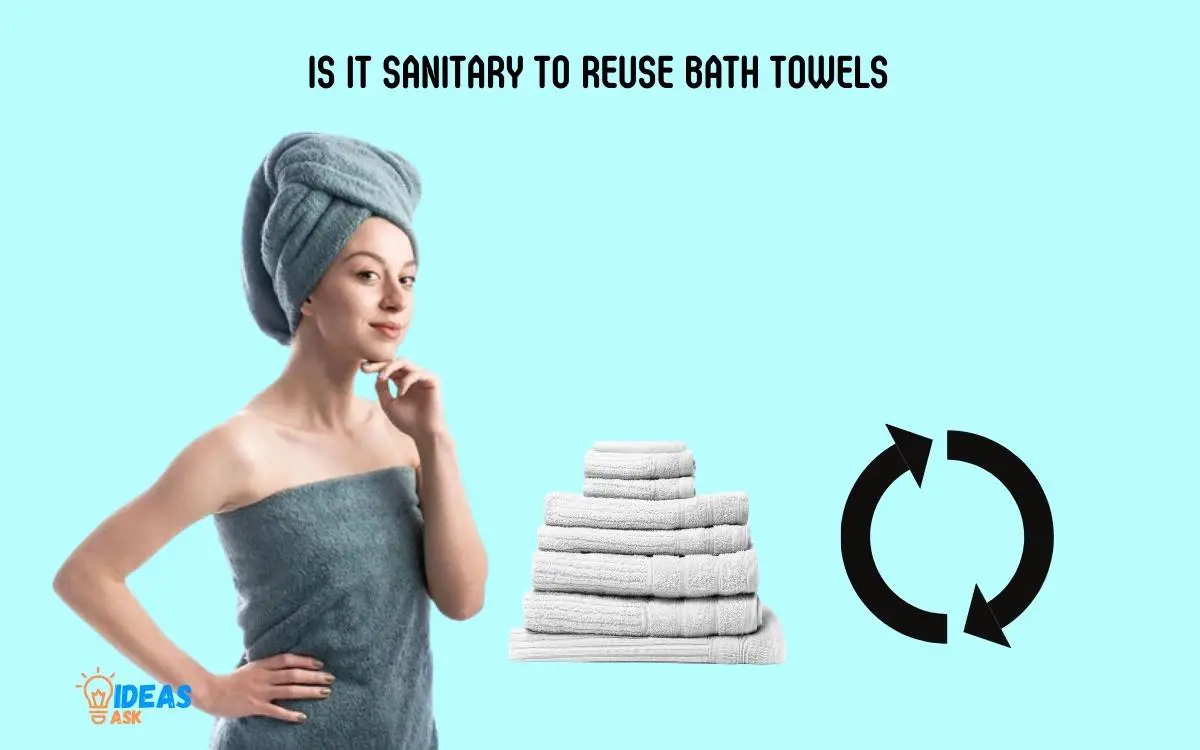Is It Sanitary to Reuse Bath Towels? Yes!
Yes, it is sanitary to reuse bath towels as long as they are properly dried after each use. However, it is recommended to wash them after three or four uses to prevent the build-up of bacteria.
Bath towels can harbor bacteria after they are used. When you dry your body with a towel, it removes dead skin cells and bacteria, which can remain on the towel.
If the towel is not dried properly and remains damp, it becomes a breeding ground for bacteria. Therefore, while it is sanitary to reuse bath towels, it is crucial to ensure that they are properly dried after each use.
To maintain hygiene with bath towels, you should hang them spread out to dry completely after each use. Bacteria multiply quickly on damp towels.
Washing them regularly, ideally every three to four uses, and using a hot dryer will effectively kill any bacteria present. Moreover, avoid sharing towels with others to prevent the spread of bacteria or infections.

Key Takeaway
Understanding The Potential Health Hazards Of Reusing Bath Towels
Reusing bath towels may pose potential health hazards due to the accumulation of bacteria and fungi, increasing the risk of infections and skin irritations. It is recommended to wash towels frequently to maintain proper hygiene and prevent health concerns.
Reusing bath towels may seem like a harmless habit, but it’s important to consider the potential health hazards associated with this practice.
While it may save you a few extra trips to the laundry room, the accumulation of bacteria, moisture retention, and introduction of germs and fecal matter can all pose risks to your health.
To better understand why reusing bath towels may not be as sanitary as you think, let’s delve into these potential health hazards:
Bacteria Buildup From Body Contact:
When you use a bath towel, it comes into direct contact with your body, providing the perfect environment for bacteria to thrive.
Here’s why:
- Dead skin cells and oils from your body can transfer onto the towel, creating a breeding ground for bacteria.
- The warm and damp environment of a used towel further promotes bacterial growth.
- If you have any cuts or skin infections, bacteria from these areas can also transfer onto the towel, increasing the risk of reinfection.
Moisture Retention And Mildew Growth:
Towels are designed to absorb moisture, and while it may be convenient to reuse a mildly damp towel, it’s important to consider the following:
- Moist towels left in a humid bathroom can take longer to dry, giving bacteria and fungi more time to multiply.
- Damp towels can develop a musty smell, indicating the presence of mildew, a type of fungus. Inhaling mildew spores can cause respiratory issues and allergies.
Introduction Of Fecal Matter And Germs:
It might surprise you, but the bathroom is not as clean as you may think.
Here’s a closer look at the potential hazards:
- In a shared bathroom, towels may come in contact with fecal matter particles from toilet flushes or improper hand washing.
- Germs and bacteria can be transferred onto towels from unwashed hands or surfaces, which can then spread to other areas of your body when reused.
Remember, maintaining proper hygiene is crucial to your overall health. While reusing bath towels may seem convenient, it’s essential to weigh the risks against the benefits.
Consider establishing a regular towel-washing routine to mitigate the potential health hazards associated with reusing bath towels.
Debunking Myths: How Often Should You Really Change Your Bath Towels?
Reusing bath towels may raise concerns about cleanliness. Discover the truth behind the myth and learn how often you should actually change your bath towels for optimal sanitation.
Have you ever wondered how often you should really be changing your bath towels? With so much conflicting information out there, it can be challenging to determine the best practices for towel hygiene.
We’ll debunk some common myths surrounding towel reuse and provide expert recommendations on towel replacement frequency.
Understanding the factors that influence towel hygiene and establishing a routine can help you maintain a sanitary environment in your bathroom.
Frequency Recommended By Experts
To ensure optimal cleanliness and minimize the risk of bacterial growth, experts recommend changing your bath towels every 2-3 uses.
However, the frequency may vary depending on individual factors such as personal hygiene practices, humidity levels, and towel quality.
It’s essential to assess these factors to determine the best towel replacement schedule for your specific needs.
Factors influencing towel replacement:
- Personal hygiene practices: If you have a robust personal hygiene routine and thoroughly dry yourself before using the towel, you may be able to extend the usage. On the other hand, if you tend to use the towel for more than drying off, such as wiping makeup or cleaning spills, it’s best to replace it more frequently.
- Humidity levels: High humidity in your bathroom can create an ideal environment for bacterial growth. If you live in a humid climate, it may be necessary to change your towels more frequently to prevent moisture accumulation and potential microbial contamination.
- Towel quality: The quality of your bath towels can also impact their durability and ability to stay hygienic. Higher quality towels made from absorbent materials tend to last longer and may require less frequent replacement compared to lower quality options.
Establishing a towel hygiene routine:
Having a dedicated towel hygiene routine can help you maintain a clean and sanitary environment in your bathroom.
Consider incorporating the following practices:
- Allow towels to dry completely between uses: Hanging your towel in a well-ventilated area or using a towel rack with sufficient airflow can expedite the drying process and reduce the likelihood of bacterial growth.
- Wash towels regularly: It’s crucial to wash your bath towels frequently to remove any bacteria or other contaminants that may have accumulated. Experts recommend washing towels every 3-4 uses, using hot water and a quality detergent to ensure proper sanitation.
- Avoid sharing towels: Sharing towels with family members or guests can heighten the risk of cross-contamination. Encourage each person to have their dedicated towel to maintain individual hygiene.
By following these guidelines and staying mindful of your personal circumstances, you can ensure that your bath towels remain sanitary and contribute to a clean and healthy bathroom environment.
Evaluating Towel Cleaning Methods: Which Is The Most Effective?
Discovering the most effective method for evaluating towel cleaning is essential when considering the sanitary aspects of reusing bath towels. Uncover the pros and cons of various techniques to ensure optimal cleanliness while reusing towels.
When it comes to towel hygiene, it’s essential to consider the different cleaning methods available to ensure optimal cleanliness.
We’ll explore the effectiveness of various towel cleaning techniques. Let’s dive in and discover which method is the most efficient for maintaining sanitation.
Traditional Washing With Detergent:
Using detergent and a washing machine is the most common method for cleaning towels, but is it the most effective?
Let’s find out:
- Regular washing with detergent helps remove dirt, sweat, and body oils from towels.
- Detergent contains surfactants that attract and lift away contaminants, leaving your towels fresh and clean.
- A thorough rinse cycle is necessary to eliminate any residual detergent from the towels.
- Ensure proper washing machine maintenance to prevent detergent buildup, as it can affect the cleanliness of your towels.
Hot Water And Bleach:
Hot water combined with bleach is a powerful cleaning method for towels, which can effectively kill bacteria and germs.
Consider the following points:
- Hot water helps to sanitize towels by killing off bacteria, viruses, and other microbial agents.
- Bleach is a strong disinfectant that can eliminate a wide range of pathogens when used correctly.
- Follow manufacturer instructions for diluting bleach and avoid using too much, as it can damage the towels.
- Rinse towels thoroughly after using bleach to remove any residual chemicals.
Alternative Cleaning Solutions And Their Effectiveness:
Apart from traditional methods, there are alternative cleaning solutions available that some people prefer.
Let’s assess their effectiveness:
- Vinegar: Vinegar is known for its natural cleaning properties. It can help remove odors and break down any detergent residue. However, it may not be as effective in killing bacteria and germs as other methods.
- Baking soda: Baking soda is a versatile cleaning agent that can be added to your laundry to enhance freshness. While it can help remove odors, it may not have strong disinfectant properties.
- Oxygen bleach: Oxygen bleach is a gentler alternative to chlorine bleach. It can effectively remove stains and sanitize towels without damaging the fabric. However, it may not be as potent in killing tough germs.
- Essential oils: Some essential oils, like tea tree oil, are known for their antimicrobial properties. Adding a few drops to your laundry may provide some additional disinfection benefits. However, it’s essential to use them in conjunction with other cleaning methods for optimal sanitation.
By evaluating various towel cleaning methods, you can choose the one that suits your preferences and ensures maximum cleanliness.
Whether you opt for traditional washing with detergent, hot water with bleach, or alternative cleaning solutions, maintain a consistent cleaning routine to keep your towels fresh and germ-free.
Remember, towel hygiene is crucial for personal health, so select a method that aligns with your cleanliness standards.
Pros Of Reusing Bath Towels
Reusing bath towels offers both personal and environmental benefits. It conserves water and energy, reduces waste, and promotes sustainability while maintaining hygiene. Using bath towels multiple times before washing them can offer several advantages.
Reusing bath towels not only helps save water and energy but also provides cost-effectiveness and sustainability. Moreover, it can contribute to a sense of psychological comfort and personal preference.
Let’s explore these benefits in detail:
Reduced Water And Energy Consumption:
- Washing towels after each use can consume a significant amount of water and energy. By reusing bath towels, you can effectively reduce your overall water and energy consumption.
- Instead of using resources to wash towels frequently, reusing them allows you to conserve water and energy, ultimately benefiting the environment.
- By adopting this practice, you contribute to water conservation efforts, supporting a sustainable future.
Cost-Effectiveness And Sustainability:
- Reusing bath towels can lead to cost savings. Washing towels less frequently translates to lower utility bills, making it a cost-effective choice in the long run.
- Additionally, by prolonging the life of your towels through reuse, you contribute to sustainable consumption patterns and reduce waste generation.
- Choosing sustainability not only benefits your finances but also supports a healthier planet for future generations.
Psychological Comfort And Personal Preference:
- Some individuals find comfort and familiarity in their own towels. Reusing bath towels offers a sense of personal comfort and can enhance the overall bathing experience.
- By reusing your own towels, you can maintain a consistent level of quality and softness, tailored to your preferences.
- Reusing bath towels also eliminates the uncertainty and dissatisfaction that may arise when using towels in unfamiliar settings, such as hotels or gyms.
Reusing bath towels provides personal and environmental benefits. It helps reduce water and energy consumption, promotes cost-effectiveness and sustainability, and offers psychological comfort and a personalized experience.
By incorporating this practice into your routine, you can contribute to a more resource-efficient and sustainable lifestyle.
Cons Of Reusing Bath Towels
Reusing bath towels may pose health risks and hygiene concerns, as they can harbor bacteria and germs. It is important to regularly wash towels to maintain sanitary conditions.
Accumulation Of Bacteria And Germs:
- The more you reuse your bath towels, the greater the chances of accumulating bacteria and germs.
- Each time you use a towel, it collects moisture from your body, creating the perfect breeding ground for bacteria.
- Even if a towel appears clean, it can still carry invisible bacteria and germs that can lead to various health issues.
- The humid environment of a bathroom provides the ideal conditions for bacterial growth on damp towels.
- Bacterial strains such as staphylococcus aureus and coliform bacteria can thrive on towels, posing a risk to your health.
- Sharing towels with others further increases the risk as it can transfer bacteria and germs between individuals.
- The accumulation of bacteria and germs on reused towels can also contribute to unpleasant odors.
Potential Skin Infections And Allergies:
- Reusing bath towels can lead to potential skin infections and allergies due to the presence of bacteria and germs.
- Bacteria like staphylococcus aureus can cause skin infections such as boils and impetigo.
- Fungal infections like ringworm and athlete’s foot can also be contracted from contaminated towels.
- Individuals with sensitive skin or skin conditions, such as eczema, may be more susceptible to developing irritations and rashes from towel bacteria.
- Allergens, such as dust mites, can accumulate on towels over time and cause allergic reactions in some people.
- Continuous exposure to dirty towels can exacerbate existing skin conditions or lead to new ones, affecting your overall skin health.
Balancing Hygiene And Sustainability:
- While the health risks associated with reusing bath towels are present, it’s important to consider the balance between hygiene and sustainability.
- Regularly washing towels at high temperatures and using disinfectants can help reduce the risk of bacterial growth and maintain hygiene.
- Opting for quick-drying towels or using a towel warmer can minimize dampness and inhibit bacterial growth.
- Implementing a towel rotation system, where each family member has their own designated towel, can reduce the spread of bacteria and germs.
- Choosing sustainable materials like organic cotton or bamboo for your bath towels can contribute to environmentally friendly practices.
- Using reusable towels for tasks that are less likely to harbor bacteria, such as drying your face, can help extend the use of towels while maintaining hygiene.
- By striking a balance between hygiene and sustainability, you can minimize health risks without compromising your eco-conscious efforts.
Establishing A Hygiene Routine For Bath Towel Reuse
Establishing a hygiene routine for bath towel reuse ensures a sanitary practice. Proper cleaning, drying, and storage techniques promote cleanliness and eliminate the risk of bacterial growth.
Have you ever wondered if it’s sanitary to reuse bath towels? Establishing a proper hygiene routine for towel reuse can help maintain cleanliness and ensure your towels are safe to use.
By managing towel usage frequency, employing proper drying techniques, and following a regular washing schedule, you can keep your bath towels fresh and germ-free.
Managing Towel Usage Frequency:
- Consider how often you use the towel before deciding to reuse or wash it.
- Use separate towels for each family member to prevent cross-contamination.
- Assess the towel’s cleanliness and odor before deciding to reuse.
- Change towels more frequently if you are sick or perspiring heavily.
- Avoid sharing towels with others to minimize the spread of germs.
Proper Drying Techniques:
- Hang towels in a well-ventilated area to allow them to air dry completely.
- Avoid folding damp towels or leaving them in a crumpled state, as this promotes bacterial growth.
- If using a dryer, ensure towels are completely dry to prevent musty odors and mildew.
Regular Washing Schedule:
- Wash bath towels at least once a week to eliminate dirt, dead skin cells, and bacteria.
- Use hot water and an adequate amount of detergent to ensure proper cleaning.
- Avoid overcrowding the washing machine to allow the towels to agitate freely.
- Preferably, wash towels separately from other clothes to prevent lint transfer and ensure thorough cleaning.
- Consider using bleach or vinegar occasionally to sanitize and eliminate odors.
By establishing a hygiene routine that includes managing towel usage frequency, employing proper drying techniques, and following a regular washing schedule, you can maintain the cleanliness and freshness of your bath towels.
Incorporating these practices will help ensure that using reusable towels remains sanitary and safe for you and your family.
Incorporating Towel Safety Measures For Optimal Hygiene
Optimize hygiene with towel safety measures for optimal cleanliness. Reusing bath towels may compromise sanitary conditions, necessitating regular washing to maintain hygiene standards. Incorporate proper towel handling practices for a germ-free bathing experience.
When it comes to maintaining optimal hygiene, one often overlooked aspect is the cleanliness of our bath towels. Reusing bath towels is a common practice in many households, but is it sanitary?
We will explore the topic of towel reuse and discuss key measures to ensure towel safety and hygiene. With these tips, you can feel confident in the cleanliness of your bath towels and maintain a healthy environment in your home.
Avoiding Towel Sharing In Households:
- Each family member should have their own designated bath towel to minimize the risk of cross-contamination.
- Sharing towels can introduce bacteria, fungi, and other microbes from one person to another.
- Using individual towels also helps everyone keep track of their own towel, reducing the chances of mix-ups.
Separation Of Hand And Body Towels:
- It is essential to differentiate between hand towels and body towels to prevent the spread of germs.
- Hand towels should be used exclusively for drying hands and should not be used to dry the body.
- Body towels should be reserved solely for drying the body after bathing or showering.
Ensuring Proper Storage And Ventilation:
- After each use, towels should be hung up to dry properly.
- Towels should be spread out to allow air circulation and prevent moisture buildup.
- Avoid storing towels in damp or overcrowded spaces, as this can promote the growth of bacteria and mildew.
By incorporating these towel safety measures into your daily routine, you can enhance the cleanliness and hygiene of your bath towels. Remember, maintaining sanitary towels is essential for optimal hygiene and overall well-being.
Striking A Balance Between Sanitation And Sustainability
Striking a balance between sanitation and sustainability is a crucial consideration when it comes to reusing bath towels.
Discover the key factors to determine if it’s sanitary to reuse them and ways to maintain cleanliness without compromising sustainability.
Reusing bath towels is a practice that many people are divided on. The debate revolves around finding a balance between maintaining sanitary conditions while also considering the environmental impact.
We will explore personal considerations in towel reuse decisions, explain how to make informed choices for optimum hygiene, and emphasize the importance of personal hygiene practices in towel reuse.
Personal Considerations In Towel Reuse Decisions:
- Frequency of towel usage: Assess how frequently you are using the towel before deciding on reusing it. Factors such as sweating, humidity, and the overall cleanliness of your body can determine if the towel requires immediate washing.
- Individual hygiene habits: Take into account your personal hygiene practices. If you are diligent in showering thoroughly, properly drying off, and keeping your towel clean, you may feel comfortable reusing it for a few days.
- Skin conditions or infections: If you have specific skin conditions or infections, it is crucial to use a fresh towel each time to prevent the spread of bacteria or irritants.
- Guest usage: When hosting guests, it is advisable to provide fresh towels for each visitor, ensuring their comfort and promoting good hygiene practices.
Making Informed Choices For Optimum Hygiene:
- Regular washing: Ensure that you follow a regular washing routine to maintain cleanliness. Laundering towels in hot water with an appropriate detergent can effectively remove bacteria, odors, and dirt.
- Separate towel usage: Encourage separate towel usage for different members of the household. This prevents the transmission of germs and helps in identifying which towel needs washing.
- Inspection before reuse: Before reusing a towel, inspect it closely for any stains, foul odors, or visible dirt. If any of these are present, it is advised to wash the towel before reusing.
- Proper drying: Allow towels to fully dry between uses to inhibit bacterial growth. Hanging them in a well-ventilated area or using a towel rack can promote faster drying.
- Quality material: Opt for towels made from high-quality materials, as they are often more absorbent and durable. This can prolong their usability and reduce the need for frequent replacements.
Emphasizing The Importance Of Personal Hygiene Practices In Towel Reuse:
- Showering habits: Maintaining proper showering habits, such as thoroughly rinsing off soap and drying off completely, reduces the likelihood of transferring dirt or bacteria onto towels.
- Personal towel identification: Encourage each family member to have a designated towel for personal use. This can minimize confusion and reduce the risk of cross-contamination.
- Hand hygiene: Emphasize the importance of washing hands before and after using towels to prevent the spread of germs.
- Regular towel replacement: Despite reusing towels, it is vital to replace them periodically to ensure they remain effective in drying and maintaining personal hygiene.
Remember, while reusing bath towels can be a practical solution for both the environment and your household, ensuring optimum hygiene requires thoughtful consideration and consistent personal hygiene practices.
By striking a balance between sanitation and sustainability, you can make informed choices that contribute to a healthier lifestyle and a greener future.
Conclusion
The question of whether it is sanitary to reuse bath towels comes down to personal preference and good hygiene practices.
While towel reuse is generally considered safe for most people, certain factors should be taken into consideration.
Regular laundering is crucial to maintain towel cleanliness, as bacteria and germs can accumulate over time. Drying towels properly, in a well-ventilated area, also helps prevent the growth of mold and mildew.
Additionally, individual health conditions and immune systems play a role in determining towel reuse practices. Ultimately, common sense and attention to cleanliness are key when making the decision to reuse bath towels.
By following proper hygiene measures and maintaining a clean environment, individuals can enjoy the convenience and sustainability of towel reuse without compromising their personal hygiene.






